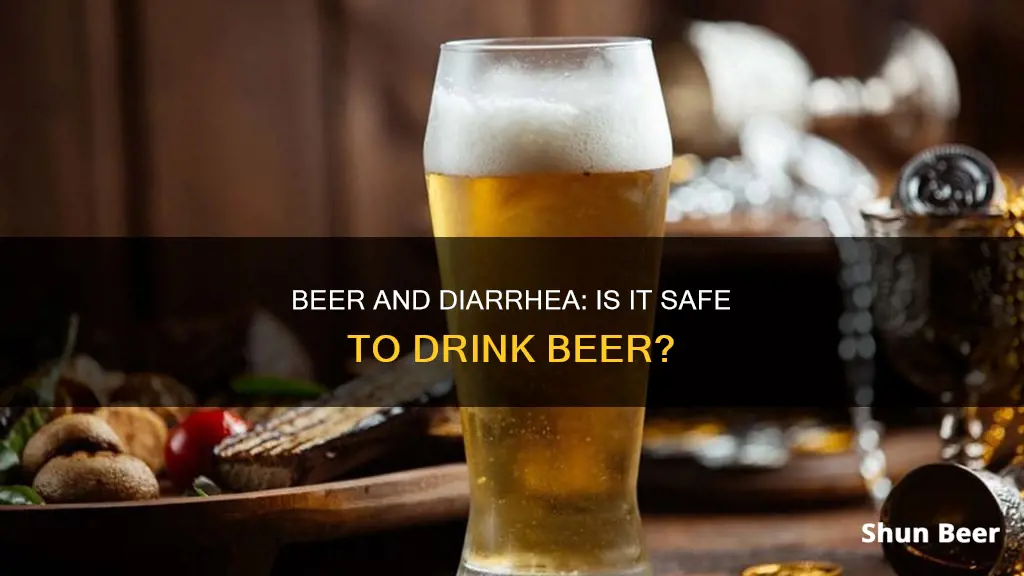
Drinking beer can cause loose motion, or diarrhoea, due to its direct irritant effect on the gut. Beer is also a high-carb drink, and so some of the carbs can reach the large intestine without being fully broken down, leading to gas, bloating, and diarrhoea. While drinking beer when suffering from loose motion is not recommended and will not help the condition, it is ultimately a personal choice.
What You'll Learn

Beer and diarrhoea
Drinking alcohol can cause diarrhoea, and beer is one of the worst offenders. This is due to several factors, including the high carbohydrate content of beer, the presence of ethanol, and the impact of alcohol on the digestive system.
Beer contains more carbohydrates than other forms of alcohol, and the body can struggle to break these down while processing alcohol. This can lead to an increased risk of diarrhoea. Ethanol, which is present in beer and other alcoholic drinks, can irritate the gut and increase intestinal motility, causing the stomach to empty more quickly. This can result in watery stools as the colon has less time to absorb water.
Alcohol can also affect the normal functions of the digestive system at every stage. It can cause inflammation in the gastrointestinal tract and increase acid production in the stomach, leading to irritation and inflammation that can contribute to diarrhoea. Alcohol disrupts water absorption in the large intestine, resulting in liquid stools and dehydration. It also agitates the intestines, speeding up digestion and causing more frequent muscle contractions in the colon, which pushes stool out faster than usual. This quickening can lead to diarrhoea as the intestines do not have sufficient time to digest food properly.
Additionally, alcohol can cause a bacterial imbalance in the intestines, killing off some bacteria species or allowing others to grow rapidly, leading to intestinal malfunction. People with certain health conditions, such as irritable bowel syndrome (IBS), are also more prone to experiencing diarrhoea after drinking alcohol.
To prevent alcohol-induced diarrhoea, it is recommended to eat before and while drinking, drink plenty of water, and avoid certain foods and drinks, such as spicy food, highly seasoned foods, dairy, greasy or fried foods, and caffeinated beverages.
Beer and Iodine: Safe Drinking Post-CT Scan?
You may want to see also

Alcohol and gut health
Secondly, alcohol can disrupt the gut microbiome, causing an imbalance between beneficial bacteria and pathogenic bacteria, known as dysbiosis. This imbalance can lead to chronic diarrhoea and wreak havoc on the stomach lining, as well as impacting the liver and pancreas.
Thirdly, alcohol can increase intestinal permeability, allowing bacteria and toxins to enter the bloodstream. This can lead to local and systemic inflammation and contribute to liver disease and neuroinflammation.
Fourthly, alcohol affects mucosal immunity, decreasing the innate immune response and triggering an inflammatory response. This can lead to a release of inflammatory immune cells and contribute to conditions such as inflammatory bowel disease.
Finally, alcohol consumption is associated with an increased risk of gastrointestinal cancers, including cancer of the oesophagus, stomach, and colon.
Moderate alcohol consumption is generally considered safe and not likely to cause gut problems. Moderate consumption is defined as no more than one drink per day for women and no more than two drinks per day for men. However, excessive alcohol consumption can lead to gut problems and increase the risk of chronic diseases such as pancreatic illness, liver disease, heart disease, and cancer. Therefore, it is important to drink in moderation and be mindful of the potential negative impacts of alcohol on gut health.
Beer and Flu Medication: A Safe Mix?
You may want to see also

Preventing alcohol-induced diarrhoea
Drinking alcohol can cause diarrhoea, and it is a fairly common experience. Alcohol can irritate the gut, and in large volumes, it can cause watery stools.
Eat before and while you drink
Eating a well-balanced meal with fibre is a good way to prevent alcohol-induced diarrhoea. Eating a snack or a meal while drinking alcohol can also help.
Avoid certain foods and drinks
Some foods and drinks can increase your chances of having diarrhoea when paired with alcohol. It is best to avoid spicy food, highly seasoned foods, dairy, greasy or fried foods, and caffeinated beverages.
Drink plenty of water
Drinking plenty of water before, during, and after consuming alcohol can prevent dehydration, which is one of the causes of diarrhoea. It is recommended to drink a glass of water for every alcoholic drink.
Eat a well-balanced breakfast the morning after
A breakfast consisting of fibre, healthy fats, and protein can promote healthy bowel movements in the short and long term.
Be mindful of your drinking habits
It is important to be aware of how much and how often you are drinking. The Centers for Disease Control and Prevention (CDC) recommend that women consume no more than one drink per day and men have no more than two drinks per day.
Drink slowly
Drinking alcohol slowly can reduce the stress on your digestive tract.
Consume non-alcoholic drinks between alcoholic beverages
Drinking a non-alcoholic drink, such as water, between each alcoholic drink can help prevent alcohol-induced diarrhoea.
Replace problematic drinks with a different type of alcohol
If you find that a particular type of alcoholic beverage causes gastrointestinal symptoms, try switching to a different type of alcohol.
Avoid caffeine
Caffeine can increase intestinal movement and speed up digestion, so it is best to avoid it if you are prone to alcohol-induced diarrhoea.
Drinking Beer on Miramar Beach: What's Allowed?
You may want to see also

Alcohol intolerance
The symptoms of alcohol intolerance include facial redness (flushing), rapid heart rate, headache, low blood pressure, hives, runny nose, and stomach pain. These symptoms can occur whether the alcoholic beverage consumed is beer, wine, or hard liquor.
People with alcohol intolerance experience a genetic mutation that makes it challenging for their bodies to break down alcohol. This condition can lead to major health problems, including an increased risk of cancers of the mouth, throat, oesophagus, stomach, and liver. Additionally, there is a heightened risk of heart disease and stroke.
The only way to prevent the uncomfortable reactions caused by alcohol intolerance is to avoid alcohol or the specific substances that trigger a response. In some cases, over-the-counter or prescription antihistamines may help alleviate mild symptoms such as itching or hives.
It is important to distinguish between alcohol intolerance and an allergic reaction to alcohol. While alcohol intolerance is a digestive system disorder, an alcohol allergy is an immune system response to ingredients in alcoholic beverages, such as chemicals, grains, or preservatives. Allergic reactions can cause symptoms like difficulty breathing, coughing, a runny nose, or stomach upset, and these can be triggered by even a small sip of alcohol.
Beer and Medication: Safe Mix or Health Risk?
You may want to see also

Alcohol and dehydration
Alcohol is a diuretic, which means it causes the body to remove fluids from the blood through the renal system (the kidneys, ureters, and bladder) at a much quicker rate than other liquids. This can lead to dehydration, especially if you don't drink enough water alongside alcoholic drinks.
Drinking alcohol on an empty stomach can also contribute to dehydration. If you drink on an empty stomach, alcohol can be absorbed into the bloodstream within minutes. However, if you drink water or eat while consuming alcohol, this process is slowed down.
Dehydration can have a range of mild to severe symptoms and can be life-threatening if left untreated. Mild symptoms include:
- Dark-coloured urine and thirst
- Dizziness
- Nausea
- Weakness
Moderate to severe symptoms include:
- Electrolyte imbalances
- Heart palpitations
- Chest pain
- High blood pressure
- Kidney disease
- Vitamin deficiencies
- Malnourishment
- Weakened immune system
- Liver disease
- Cirrhosis
To prevent alcohol-induced dehydration, it is recommended to:
- Drink alcohol in moderation (one drink per day for women, two drinks per day for men)
- Drink alcohol slowly (it takes the liver about one hour to process each serving of alcohol)
- Drink water while consuming alcohol (aim for at least one glass of water per alcoholic drink)
- Drink water regularly, before and after drinking alcohol
- Drink other hydrating beverages, such as electrolyte-fortified water or sports drinks
- Avoid sugary and caffeinated beverages, as they can promote dehydration
- Eat hydrating foods, such as those with high water content
- Avoid fried foods and those high in sodium, protein, and sugar, as they can also promote dehydration
Overall, the key to avoiding dehydration is to pay attention to how your body responds to alcohol and adjust your consumption accordingly.
Invisalign and Beer: Is It Safe?
You may want to see also
Frequently asked questions
Yes, but it may irritate your stomach and worsen your condition.
Beer is a high-carb drink, and when these carbs reach the large intestine, they can be broken down by bacteria, leading to gas, bloating, and diarrhoea.
Yes, it is recommended to drink clear fluids like water, broth, juice, and herbal teas to replace fluid loss and prevent dehydration.
Eat plain, easily digestible foods such as rice, plain crackers, toast, and chicken to fill your stomach without causing further issues.
If you experience rectal discomfort, bloody or black stools, dehydration symptoms, unintended weight loss, fever, or persistent vomiting, seek medical advice promptly.







